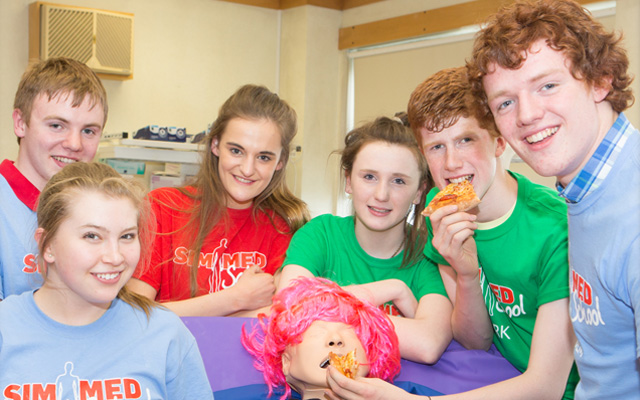You are here
Transition Year students experience life as a junior doctor at the Saolta Simulation Centre

After the success of the inaugural SIMMed School in 2014, over 30 transition year (TY) students from across the West of Ireland attended the Saolta Simulation Centre at University Hospital Galway on Monday 23th March 2015 to experience what it is like to be a junior doctor.
SIMMed School is a programme developed at Saolta University Health Care Group for transition year students with an interest in pursuing a career in medicine. It is designed to immerse the student into the world of a junior doctor, managing acute medical emergency scenarios, performing procedures, communicating with relatives and staff, while working as part of a multidisciplinary team in a simulated environment.
The programme is delivered by a team of medical experts including doctors, nurses, emergency medicine technicians and allied health professionals, who recreate the hospital environment for the students with the help of a team of simulator technicians. The students play the role of a junior doctor and oversee the care of the simulated patient known as ‘Simman’. This is a fully responsive manikin who talks and responds to treatments. During every simulation, Simman is unwell and the students must diagnose and treat him. They work in a team and develop both their technical and non-technical skills such as communication, leadership, situation awareness and decision-making.
The students perform technical skills using high tech simulators that lookS and feels like any human being. The skills demonstrated and taughtinclude taking blood, connecting drips, passing a urinary catheter, applying a plaster cast and learning to suture wounds.
SiMMed School is the brainchild of Dr. Dara Byrne, the Director of Simulation and Intern Co-ordinator for the Saolta Hospital Group. Speaking at the event, she said "This is a first of its kind programme for transition year students in the West of Ireland. It is a fully immersive experience for students with an interest in a career in medicine. They experience first-hand what it is like to work as a junior doctor. They embrace the challenge and learn the importance of being both technically skilled and a good communicator.”

